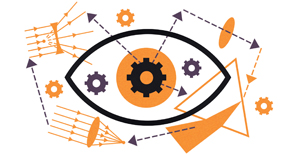 Daniel BuenoA doctorate in physics at the Massachusetts Institute of Technology (MIT), begun in 1978 and completed in 1981, brought about a cultural change in the life of Jarbas Caiado de Castro Neto, 61, professor at the Physics Institute of the University of São Paulo (USP) and one of the founding partners of the company Opto Eletrônica in São Carlos, São Paulo State, in 1986. “When I arrived at MIT I was impressed when I saw my advisor, a researcher in the field of atomic physics, focus more on industry problems than on academic work, which was totally different than what was happening at the time at Brazilian universities,” says Castro Neto. Originally from Belo Horizonte, his family moved to Fortaleza when he was 10. He lived there until 1972, and then moved to São Carlos, in the state of São Paulo, where he completed his undergraduate and master’s degrees in physics at USP.
Daniel BuenoA doctorate in physics at the Massachusetts Institute of Technology (MIT), begun in 1978 and completed in 1981, brought about a cultural change in the life of Jarbas Caiado de Castro Neto, 61, professor at the Physics Institute of the University of São Paulo (USP) and one of the founding partners of the company Opto Eletrônica in São Carlos, São Paulo State, in 1986. “When I arrived at MIT I was impressed when I saw my advisor, a researcher in the field of atomic physics, focus more on industry problems than on academic work, which was totally different than what was happening at the time at Brazilian universities,” says Castro Neto. Originally from Belo Horizonte, his family moved to Fortaleza when he was 10. He lived there until 1972, and then moved to São Carlos, in the state of São Paulo, where he completed his undergraduate and master’s degrees in physics at USP.
Back in Brazil, at USP where he has taught since 1977, Castro Neto faced another problem, the difficulty in importing optical components such as prisms and precision lenses in order to carry out experiments. At the time, Brazil was still closed to imports. That was when, in 1983, he decided to set up an enterprise to produce optical components inside the Institute of Physics, called the optical workshop and which still exists today. “It represented a true revolution in optics research in Brazil,” he says. “Colleagues began to use the workshop and, over time, industry started seeking us out to produce optical instruments.” Due to the strong interest in the workshop’s services, Castro Neto, two students and two technicians decided to found Opto Eletrônica. In the beginning, the company manufactured optical components for industry, and over time began to produce instruments for medical applications, the Brazilian space program, and national defense systems. The cameras in the China-Brazil Earth Resources Satellites (Cbers 3 and 4), for example, were developed and manufactured by Opto.

personal archivesCastro Neto: professor and entrepreneurpersonal archives
The demand for the company’s high-tech products resulted in sales of R$100 million in 2010, at which time it had 450 employees. Then the outlook changed. “Brazil’s low economic growth rate affected high-tech companies like Opto the most,” says Castro Neto. In July 2012 the partners hired professional managers and at that point the CEO became less involved with the firm and remained only as a partner. He decided to take on new projects at the university, including setting up a laboratory for optical innovations in agriculture. One of the projects developed together with Embrapa Instrumentação, in São Carlos, resulted in portable optical equipment that can be carried into fields to detect greening (an incurable disease that attacks orange groves) in the asymptomatic stage. “Field tests are being carried out and a company is already interested in manufacturing the device,” he says.
Castro Neto has also participated in the founding of other small companies that are still active and growing, but he is no longer involved with them. And during all the time he was managing Opto, he also continued to teach at USP and publish articles. “The university is where everything happens: knowledge, exchanges, rejuvenation of ideas.” According to Castro Neves, while physicists’ work might have been restricted to the university in the past, today they are increasingly important for Brazilian technological development.
Republish
